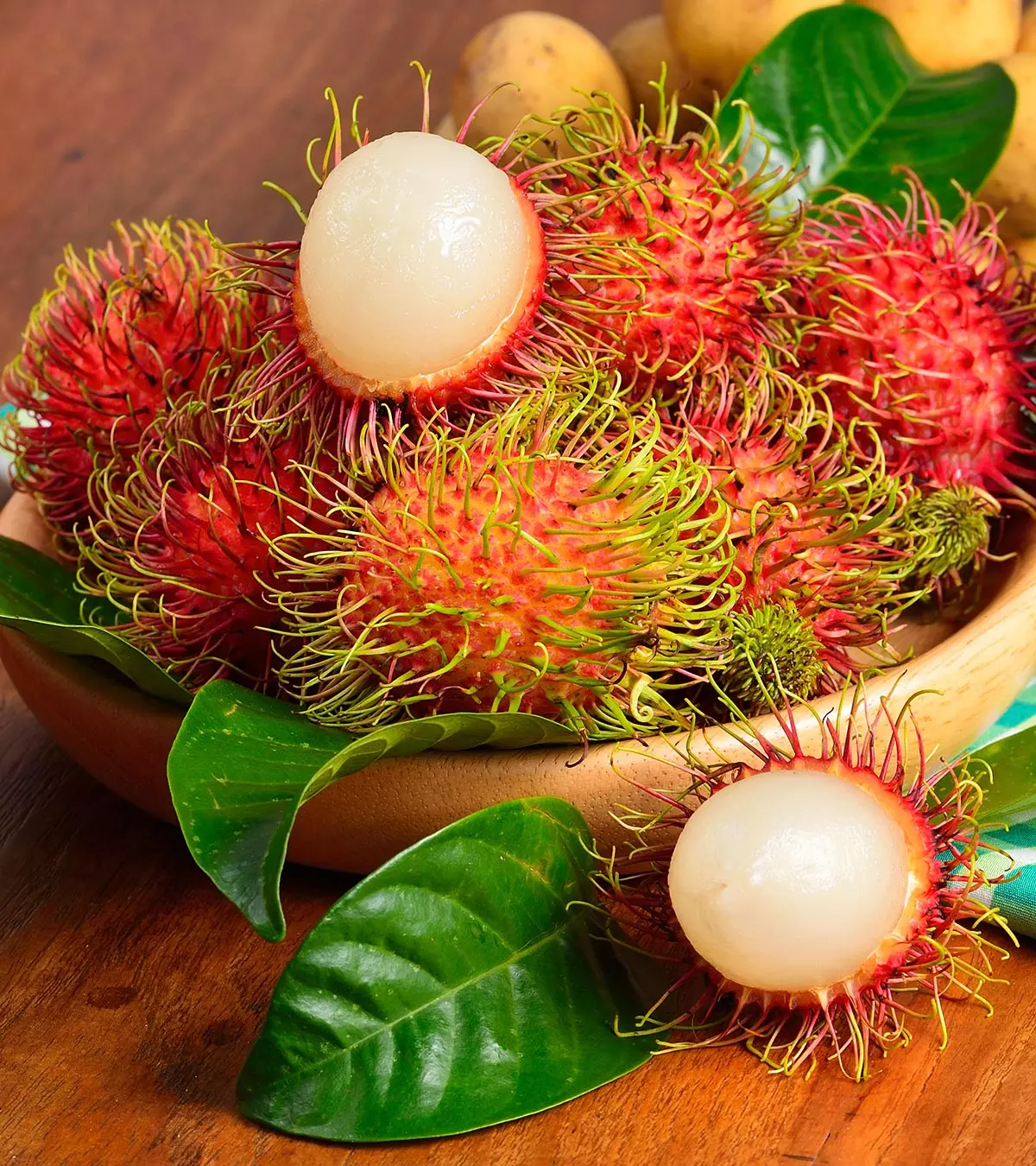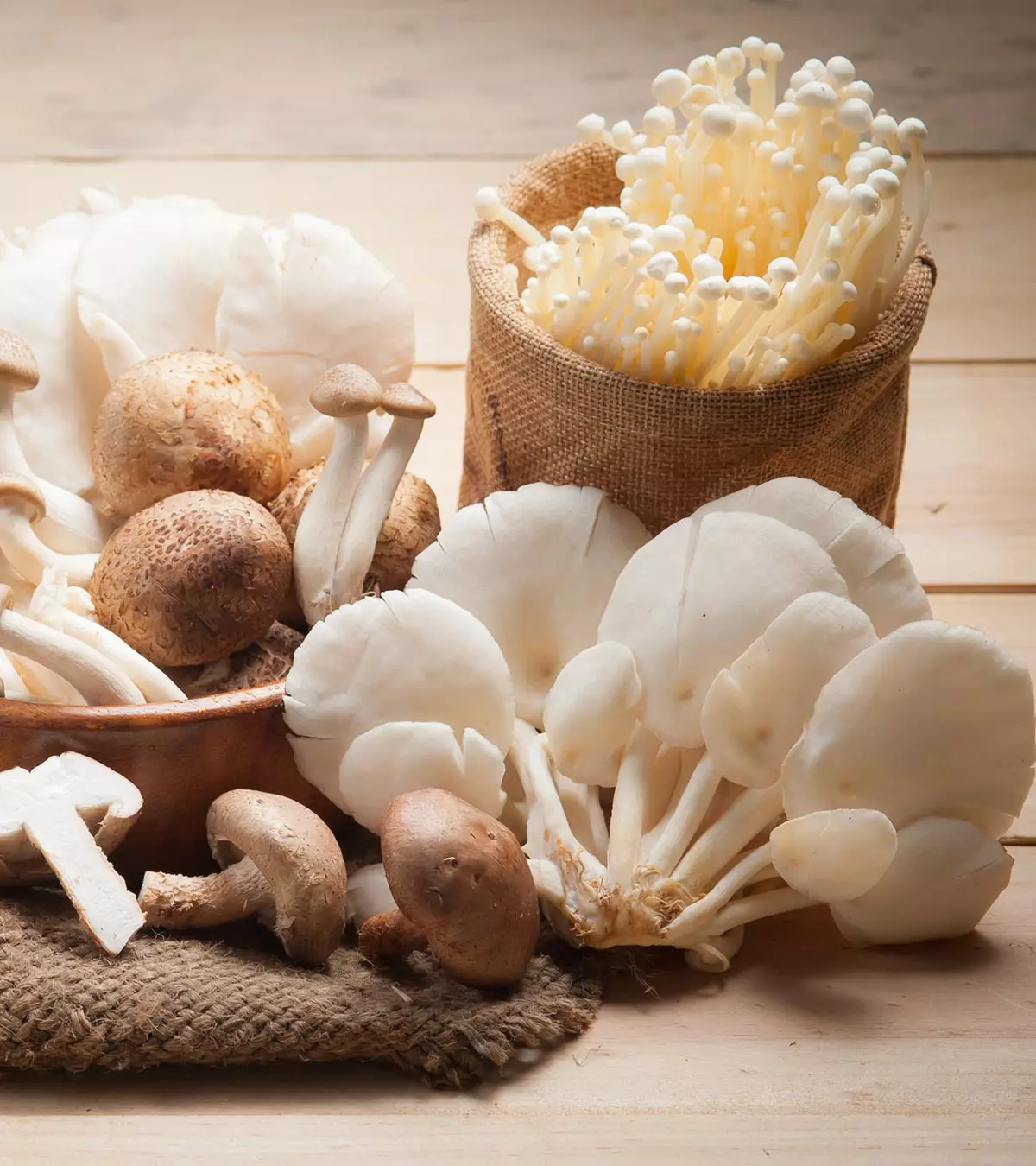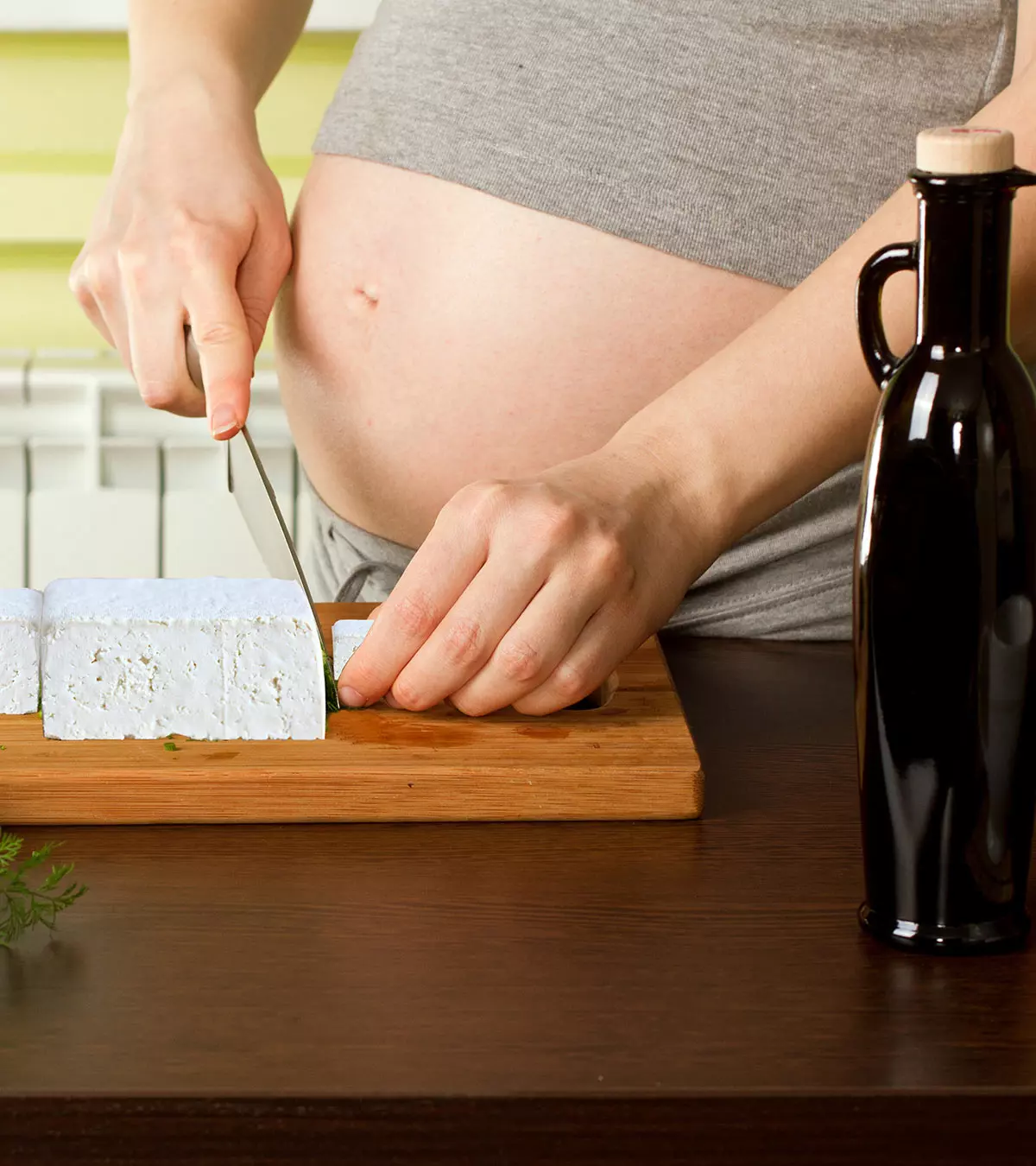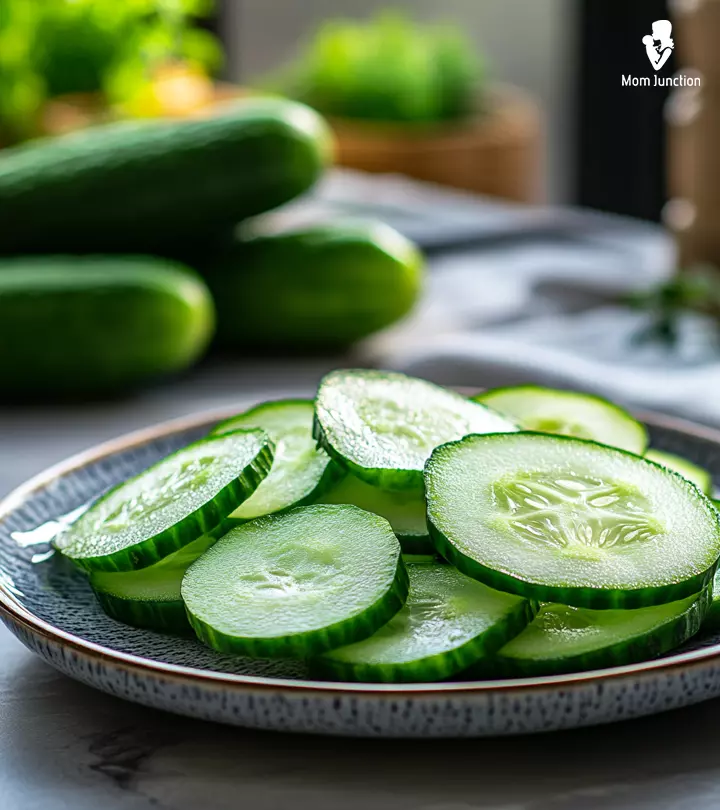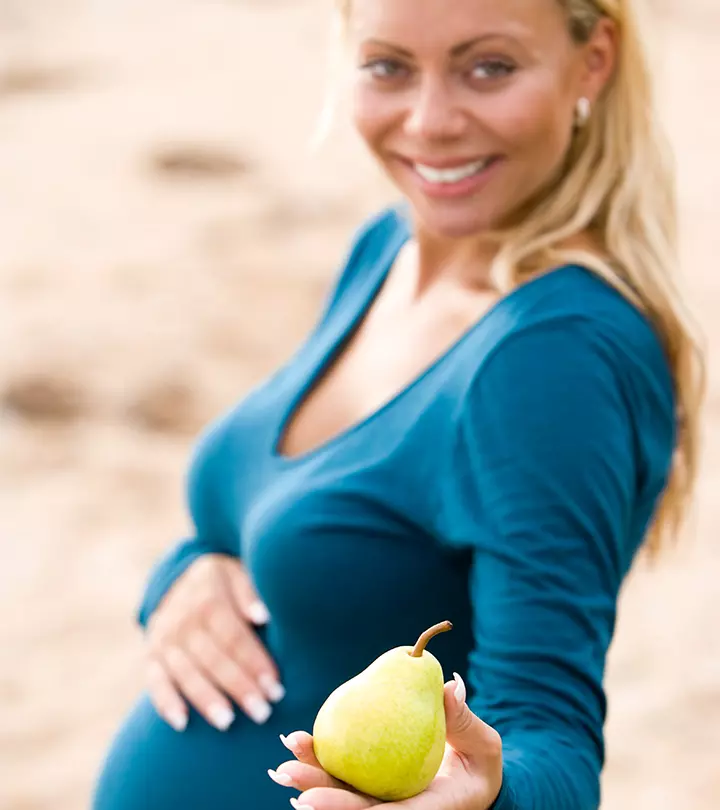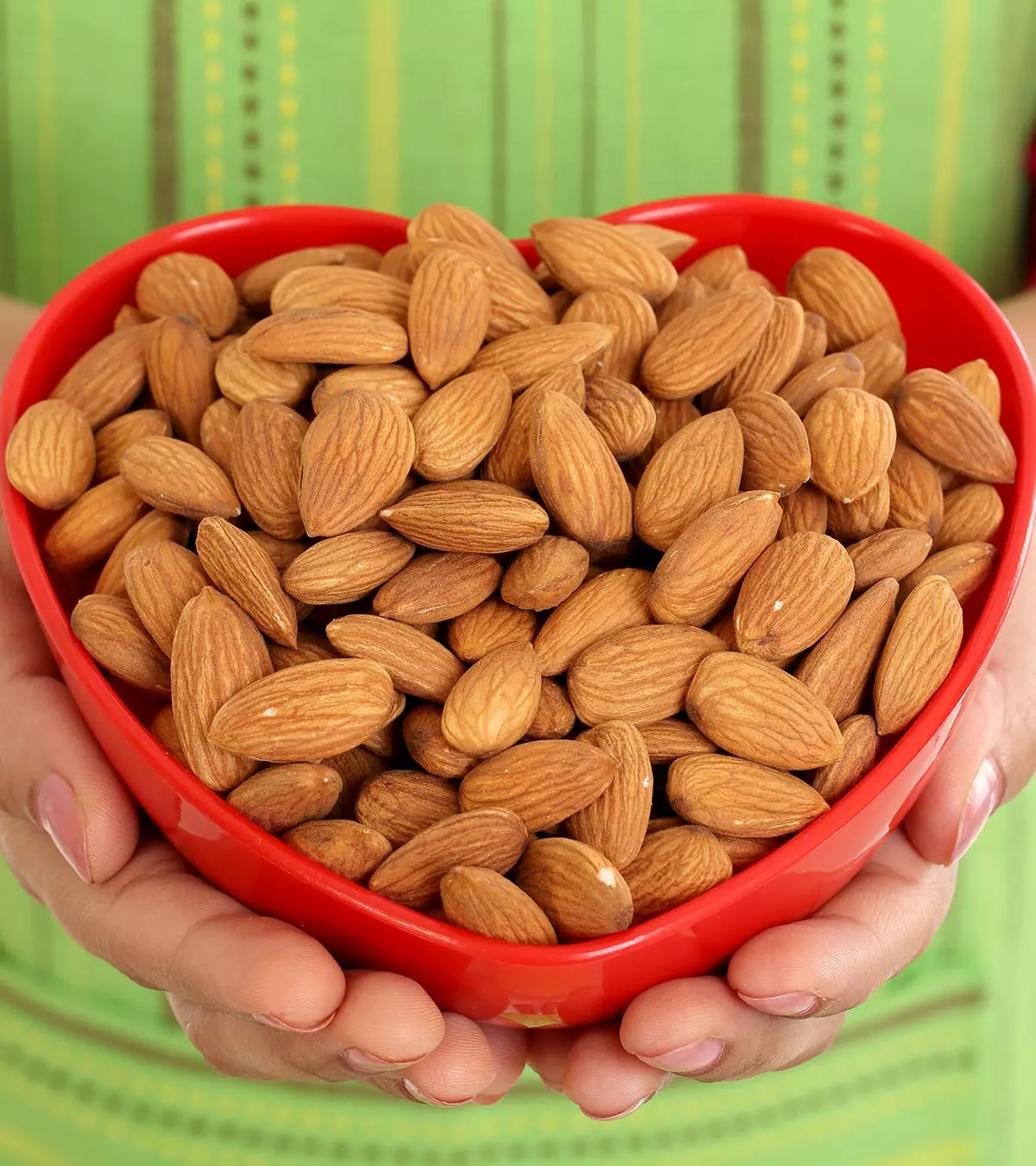
Image: ShutterStock
Would-be-mothers are often advised against consuming nuts if they have a family history of nut allergies. However, on the contrary, present research reports consuming nuts such as peanuts, walnuts, and almonds during pregnancy to be beneficial for the growth and development of the baby. In addition, a study shows eating tree nuts regularly can reduce nut allergies in babies whose moms are not themselves allergic to nuts (1) (2). Though almonds are considered at par with superfoods, it is good to be mindful of how and when to eat these nuts when pregnant. Almonds are rich in essential nutrients, including healthy fats, fiber, and vitamins, supporting maternal health and fetal development. Incorporating almonds into your diet can also help manage weight, control blood sugar levels, and provide lasting energy during pregnancy. This post helps you understand whether almonds aid in fulfilling the nutritional needs of a mom-to-be and more about including them in your pregnancy diet.

Key Pointers
- Almonds are a great source of iron, calcium, folic acid, and fiber for those without nut allergies.
- Soaked almonds (one oz. daily) are considered better than raw almonds nutritionally.
- Eating almonds during pregnancy can reduce the risk of neural defects and help in bone development in the fetus.
- Almonds also help in managing weight and enhance metabolism during pregnancy.
- Excessive consumption of almonds may lead to weight gain, allergic reactions, bloating, or constipation during pregnancy.
Is It Safe To Eat Raw Almonds During Pregnancy?
Yes, it is safe to consume raw almonds as they are power packed with mixed nutrients rich in iron, calcium, folic acid, and fiber. However, pregnant women should avoid eating almonds or any other nuts as a part of their prenatal diet if they are prone to allergies (3).
 Did you know?
Did you know?Can You Eat Wet (Soaked) Almonds During Pregnancy?
You can eat soaked almonds, unless you are allergic to them. Soaked almonds release enzymes that help in digestion and increase the nutrient value of the nut. Soaking them overnight helps ease digestion and aid in the removal of brown skin that usually contains tanniniWater-soluble polyphenols found in various plant products. , and tannin is known to reduce nutrient absorption (4).
Are Soaked Almonds Better Than Raw?
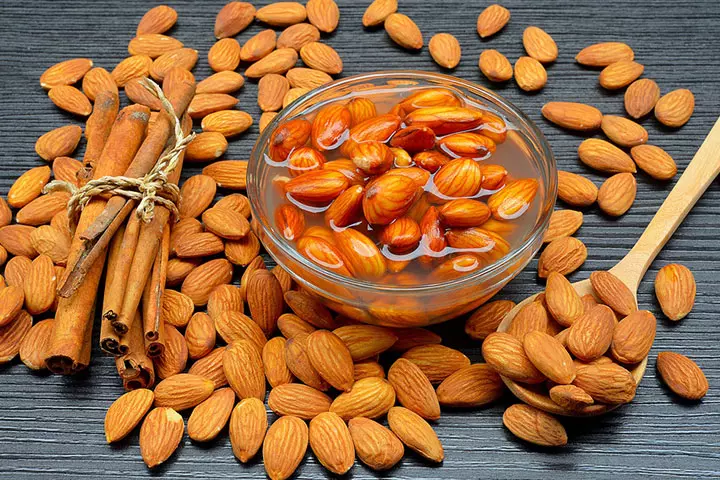
Though both the forms are healthy, soaked almonds could be a better option to include in your maternal diet. And, below we give you reasons (5).
1. Degenerates phytic acid
Phytic acid present in plants improves the life of nuts and seeds. But, it also slows down the absorption of essential minerals in our body. Therefore, too much phytic acidiA chemical compound that is the prime source of phosphorous in oilseeds, nuts, grains, and legumes. can cause mineral deficiency.
Soaking nuts overnight helps remove phytic acid and releases phosphorus that is good for bone health, and easy digestion.
2. Neutralizes enzyme inhibitors
On soaking the nuts along with salt, enzyme inhibitors are neutralized, and beneficial enzymes are released increasing the bioavailability of vitamins in nuts.
The enzyme inhibitors halt the gluten degenerating enzymes. But on neutralizationiA chemical reaction in which an acid and a base effectively react with each other. , enzymes that help in gluten breakdown are released and ease the process of gluten digestion. It digests the gluten before reaching the gut thus making digestion easier than with dry nuts.
3. Neutralizes tannin
Tannin offers a yellowish tinge to the nuts and gives a bitter taste. However, it is water soluble, and when nuts are soaked, tannin degenerates and reduces the bitter taste, making the nuts taste sweeter.
Soaked or unsoaked, almonds, in general, offer several benefits during pregnancy.
What Are The Benefits Of Almonds During Pregnancy?
Almonds are packed with great nutrients essential for the mother, and the growth and development of the baby
. The nutritional benefits include:
1. Folic acid prevents neural defects

Raw or soaked almonds are the best sources of folic acid (6) that significantly helps in the development of the neurological system and fetal brain. Folic acid is also essential to prevent neural tube defects in the baby (7). During pregnancy, you will require about 400mcg of folic acid to meet the baby’s requirements (8).
2. Enhances metabolism
Children born to obese or diabetic women have increased chances of developing obesity and metabolic issues. Almonds provide a healthy source of carbs and dietary fat that aid metabolism, and reduce inflammation, oxidative stress, and blood sugar (9).
3. Prevents excessive weight gain
Pregnancy causes weight gain, and thanks to the cravings, it sometimes gets difficult to control the weight. Almonds can keep you full for a longer time, therefore, lowering the risk of unnecessary weight gain. Consumption of almonds as a snack can keep you full for a longer time, therefore, lowering the risk of unnecessary weight gain.
Emphasizing the benefits of almonds as a snack, Lisa Richards, nutritionist and the founder of Candida Diet, says, “Using almonds as a snack can provide you with the benefits of antioxidants such as improved cellular health and reduced inflammation in the body. Antioxidants like vitamin E, found in almonds, combat free radical damage caused by toxins in our food and environment.”
4. Supplies iron
1oz of almonds contains 1.1mg of iron,which meets 6% of your daily iron requirements. As iron requirement is high during pregnancy, especially in the first trimester, you will surely get it from the daily consumption of adequate almonds. It will help you steer clear from the risks of anemia.
5. Protects the child from future allergies
According to a study, consuming nuts during pregnancy will protect your child from allergies later in life. Therefore, you can consume a safe proportion of nuts such as almonds, and peanuts to decrease the probability of allergies in children (10).
High nut intake is believed to be inversely related to asthma in children, as nuts contain vitamin E and zinc, both of which protect the child from asthma (11).
 Research finds
Research finds6. Protein provides stamina
Almonds contain a good amount of protein that provides strength and stamina required for delivery. The protein also aids in the healthy development of the baby and keeps the mother’s weight under check.
7. Fiber stimulates digestion

Being rich in fiber, almonds help ease digestion and regulate bowel movements. They also treat constipation problems that are very common issues of the digestive system during pregnancy.
8. Helps manage sugar levels
Almonds are a low-glycemic index (GI) food packed with fiber and unsaturated fats (12). Besides, they contain relatively low amounts of carbohydrates. Studies suggest consuming almonds may help lower fasting insulin and glucose levels (13). It also can potentially improve markers of insulin sensitivity in people with prediabetes (14). According to a randomized controlled trial in teens and young adults, almonds might help reduce HbA1c in as little as 12 weeks (15). However, the role of almonds in treating, reducing, or managing gestational diabetes isn’t well established. Hence, expecting women should consume almonds in moderation as a part of a well-balanced diet.
9. Calcium strengthens bones
One ounce of almonds provides around 75mg of calcium. It helps lower the risk of pre-eclampsiaiA condition in pregnancy marked by high blood pressure and a rise in protein in the urine. , and also assists in bone formation in the unborn.
Let’s look at the nutritional value of almonds.
What Is The Nutritional Value In Almonds?
Every 100g of raw almonds contain the following nutrients (16):
| Nutrients | Value per 100g |
|---|---|
| Energy | 579kcal |
| Protein | 21.2g |
| Carbohydrate | 21.6g |
| Fiber | 12.5g |
| Sugars | 4.35g |
| Calcium | 269mg |
| Iron | 3.7mg |
| Magnesium | 270mg |
| Phosphorus | 481mg |
| Sodium | 1mg |
| Zinc | 3.12mg |
| Thiamin | 0.205mg |
| Niacin | 3.7mg |
| Riboflavin | 3.7mg |
| Vitamin B6 | 0.137mg |
| Folate | 44mcg |
| Vitamin E | 25.63mg |
The benefits and nutritional values are convincing enough for you to add almonds to your diet. However, the nuts will be helpful only if eaten in a limited quantity.
How Many Almonds Can You Eat Per Day During Pregnancy?
Whether raw or soaked, you can have up to one oz, which equals one-third of a cup or approximately 23 almonds, as per the USFDA
Try having soaked almonds early in the morning. Try to incorporate almonds as part of a balanced breakfast or as an afternoon snack to sustain energy levels throughout the day. You should not eat more than the suggested quantity as it can lead to unpleasant effects such as weight gain, vitamin E toxicity, and digestive problems.
When To Eat Almonds During Pregnancy?
You can eat almonds throughout pregnancy irrespective of the trimester. Have around ten in the morning and ten in the evening, or chalk your own plan as per your convenience.
But, do consult a doctor before increasing the number of these dry fruits in pregnancy, as consuming too many almonds might lead to some side effects.
What Are The Possible Side Effects Of Eating Almonds In Pregnancy?
These effects are not severe and can be easily avoided.
1. Overeating causes weight gain

Though almonds increase good cholesterol levels in the body, eating too many may lead to weight gain as they contain high calories and fats.
2. Medication interactions
Almonds are a rich source of manganese where one ounce gives around 0.6mg of the mineral. Manganese helps in various body functions. But a high level of the mineral poses the risk of pretermiWhen a child is born before the 37th week of pregnancy. delivery (17).
3. Gastrointestinal issues
If you are eating almonds along with a high-fiber diet, it could lead to gastrointestinal issues such as bloating, constipation, and abdominal cramping because your body will not be able to process or digest too much of fiber.
4. Allergic reactions
Over consumption of almonds can trigger your immune system causing an allergic reaction. In rare cases, you may develop rashes and breathing difficulties.
5. Vitamin E effects
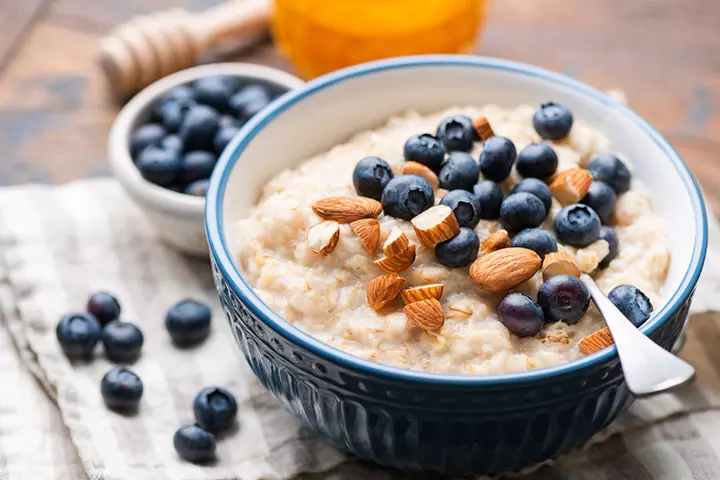
Consuming a diet rich in vitamin E containing almonds, whole grains, eggs, spinach, and more can lead to harmful effects such as blurred vision, diarrhea, flatulenceiReleasing gas from the digestive tract through the back passage. , and headache. Therefore, you might want to take some precautions while eating almonds.
What Precautions Should You Take While Eating Almonds?
Here is what you can do:
- Consult your doctor before planning to add almonds to your diet.
- Consume them in a natural state. Avoid the other varieties found in the market such as salt coated, sugar coated, or chocolate coated almonds.
- Buy almonds from standard brands and/ or organic ones.
- Wash the almonds thoroughly to wash off any harmful bacteria on their surface. Packaged varieties have fewer chances of having bacterial infection.
While you can have either raw or soaked almonds, below we list a few ways in which you can include almonds in your diet.
How To Add Almonds To Your Pregnancy Diet?
Consuming dry fruits in pregnancy is essential. Try these ways to incorporate almonds in your diet.
- Soak almonds overnight, and make a fine paste the following morning. Mix it with a glass of milk and consume it fresh. You can also try making almond milk at home. Consuming almond milk during pregnancy is a great way to add almonds to your pregnancy diet.
- Have 10 to 12 soaked and peeled almonds, along with a glass of milk, as your first meal in the morning.
- Make a fine paste of almonds to get almond butter. It is a wonderful source of proteins, healthy fats, fiber, and lowers bad cholesterol. You can eat it with toast.
- Finely dice the soaked almonds, and you can sprinkle on different dishes such as salads, oatmeal, and yogurt. It gives a rich and crunchy taste to the dish.
- Bake them along with homemade muffin and bread recipes for a nutritional boost.
You do not have to worry about eating almonds during pregnancy. If you have a habit of having soaked almonds as the first thing in the morning, you may continue with it during your pregnancy as well. However, be mindful of the quantity you consume. Anything that is eaten beyond limits is harmful.
Frequently Asked Questions
1. Is the skin of almonds toxic?
Skin of raw almonds is edible and offers great nutrition. But make sure to soak them to release enzyme inhibitors so that it eases the digestion process.
2. Can you get cyanide poisoning from eating almonds?
Cyanide poisoning is rare as almonds contain trace amounts of this toxin. As you know, there are two types of almonds – bitter and sweet. The almonds we get and eat are the sweet ones and they contain low levels of cyanide, but bitter almonds contain 50 times more cyanide per nut making them lethal.
To make it simple, you need about 1,000 sweet almonds to reach toxicity while you need only 10 to 30 bitter almonds to reach the lowest possible lethal level. Also, any form of cyanide that enters into the body system will be eliminated within one day.
3. Is it good to eat almonds on an empty stomach?
You do not have to worry about eating almonds during pregnancy. If you have a habit of having soaked almonds as the first thing in the morning, you may continue with it during your pregnancy as well. However, be mindful of the quantity you consume. Anything that is eaten beyond limits is harmful.
4. Can pregnant women eat almond flour?
Yes. Pregnant women can eat almond flour in moderation as a part of a healthy, well-balanced diet. You can purchase almond flour from a reputable brand or prepare it at home. While purchasing, read the nutrition label carefully to ascertain product safety. Also, note any other ingredients that may be added to the flour to enhance its taste and texture.
Almond extract is a concentrated liquid prepared from bitter almond oil, alcohol, and water. It is often used as a flavoring agent in baked and frozen goods, sauces, marinades, and beverages. Its consumption in small amounts, as used in foods, should be safe for healthy pregnant women. However, it is advisable to speak to your doctor and ascertain almond extract’s safety for you.
If the expectant mother does not have a nut allergy, eating almonds during pregnancy could be beneficial to both the mother and the fetus’ health. Almonds are loaded with essential pregnancy nutrients, including iron, calcium, folic acid, and fiber. While you may eat almonds in raw, soaked, or roasted forms, soaked almonds are favored owing to their added health advantages, like degeneration and neutralization of certain compounds. While almonds are safe to consume during any trimester, consuming an adequate amount is necessary to avoid side effects.
Infographic: Benefits And Side Effects Of Almonds During Pregnancy
While pregnant, you must be cautious of anything you consume. So, if you plan to include almonds, scroll through this infographic below to learn about the advantages and disadvantages of having almonds during pregnancy in the following infographic. Save it and share with other expectant mothers!
Some thing wrong with infographic shortcode. please verify shortcode syntax
Some thing wrong with illustration image shortcode. please verify shortcode syntax
References
- Eating nuts during pregnancy may protect baby from nut allergies.
https://scopeblog.stanford.edu/2017-09-27-donor-gift-leads-to-innovative-cancer-clinical-trial/ - Iván López-Expósito et al.; Maternal peanut exposure during pregnancy and lactation reduces peanut allergy risk in offspring; J Allergy Clin Immunol (2010).
https://www.ncbi.nlm.nih.gov/pmc/articles/PMC2801422/ - Macadamias for body mind and mood.
https://www.australian-macadamias.org/health-wellbeing/ - K T Chung et al.; Tannins and human health: a review; Crit Rev Food Sci Nutr (1998).
https://pubmed.ncbi.nlm.nih.gov/9759559/ - Raj Kishor Gupta et al.; Reduction of phytic acid and enhancement of bioavailable micronutrients in food grains; J Food Sci Technol (2015).
https://www.ncbi.nlm.nih.gov/pmc/articles/PMC4325021/ - Nutrition and Diet for a Healthy Pregnancy.
https://msdh.ms.gov/page/41,0,376,428.html - Prevention of neural tube defects: results of the Medical Research Council Vitamin Study. MRC Vitamin Study Research Group; Lancet (1991).
https://pubmed.ncbi.nlm.nih.gov/1677062/ - Folic Acid: Facts for Clinicians.
https://www.cdc.gov/folic-acid/hcp/clinical-overview/?CDC_AAref_Val=https://www.cdc.gov/ncbddd/folicacid/recommendations.html - Emilio Ros; Health Benefits of Nut Consumption; Nutrients (2010).
https://www.ncbi.nlm.nih.gov/pmc/articles/PMC3257681/ - Peanut and tree nut consumption during pregnancy and allergic disease in children—should mothers decrease their intake? Longitudinal evidence from the Danish National Birth Cohort.
https://www.sciencedirect.com/science/article/abs/pii/S0091674912007944 - Low Maternal Vitamin E Intake during Pregnancy Is Associated with Asthma in 5-Year-Old Children.
https://www.atsjournals.org/doi/pdf/10.1164/rccm.200512-1946OC - Nuts almonds.
https://fdc.nal.usda.gov/fdc-app.html#/food-details/170567/nutrients - Sare Bakouei et al.; High Intake of Manganese During Second Trimester Increases the Risk of Preterm Delivery: A Large Scale Cohort Study; Glob J Health Sci (2015).
https://www.ncbi.nlm.nih.gov/pmc/articles/PMC4803871/ - Florence Gignac et al.; Maternal nut intake in pregnancy and child neuropsychological development up to 8 years old: a population-based cohort study in Spain; National Library of Science (2019).
https://pubmed.ncbi.nlm.nih.gov/31062119/
Community Experiences
Join the conversation and become a part of our nurturing community! Share your stories, experiences, and insights to connect with fellow parents.
Read full bio of Dr. Shikha Sharma
- Lisa Richards is a certified nutritionist coach from the Institute for Integrative Nutrition. She is an author at the Candida Diet (thecandidadiet.com), with 17 years of experience.
 Lisa Richards is a certified nutritionist coach from the Institute for Integrative Nutrition. She is an author at the Candida Diet (thecandidadiet.com), with 17 years of experience.
Lisa Richards is a certified nutritionist coach from the Institute for Integrative Nutrition. She is an author at the Candida Diet (thecandidadiet.com), with 17 years of experience.
Read full bio of Swati Patwal
Read full bio of Rebecca Malachi
Read full bio of Aneesha Amonz









